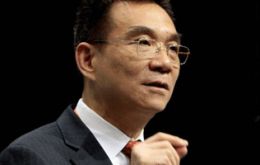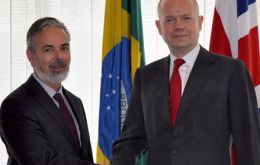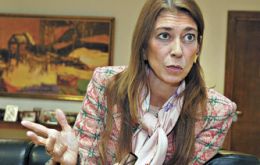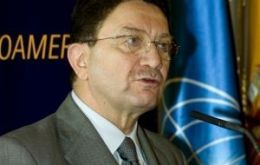MercoPress. South Atlantic News Agency
Stories for January 2012
-
Thursday, January 19th 2012 - 04:00 UTC
“Get ready” a big storm is on its way, warns the latest World Bank forecast

The World Bank warned developing countries today to prepare for the “real” risk that an escalation in the Euro area debt crisis could tip the world into a slump on a par with the global downturn in 2008/09.
-
Thursday, January 19th 2012 - 03:57 UTC
Brazilian government considers Argentina “a permanent problem” in economic issues

Industry and Foreign Trade minister Fernando Pimentel expressed on Wednesday the Brazilian government’s deep disappointment with the latest Argentine legislation to be implemented on trade saying that Argentina is “a permanent problem”.
-
Thursday, January 19th 2012 - 03:52 UTC
Argentine government calls on unions and businesses to act with “responsibility”

Argentine acting President, Vice-President Amado Boudou called on businessmen and union workers to act with “responsibility” in direct reference to the upcoming round of wage negotiations that will be held later this year and unions have anticipated will have to be referred to workers “pocket” inflation.
-
Wednesday, January 18th 2012 - 23:38 UTC
IMF anticipating major storms wants to boost war chest by 600 billion dollars

The International Monetary Fund is seeking to boost its war chest by 600 billion dollars to help countries reeling from the Euro zone debt crisis, but some nations insist Europe must first do more to support its ailing members, international financial sources said on Wednesday.
-
Wednesday, January 18th 2012 - 23:35 UTC
Timerman and Randazzo lash back at Cameron over Falklands’ dispute

Argentine Foreign Minister Héctor Timerman echoed the statements made by UK’s Prime Minister David Cameron in which he accused Argentina of “colonialism,” and counter attacked by saying that “it catches one’s attention to hear such statements when Great Britain and Colonialism are synonymous.”
-
Wednesday, January 18th 2012 - 21:34 UTC
Busy March for Rousseff: President Obama, Chancellor Merkel and BRICS summit

Brazilian president Dilma Rousseff will be meeting her US peer Barack Obma next March when she is also scheduled to hold talks with Germany’s Chancellor Angela Merkel and attend a BRIC group summit.
-
Wednesday, January 18th 2012 - 21:02 UTC
Hague praises Brazil’s global presence and reaffirms British policy towards the Falklands

Britain's Foreign Secretary William Hague praised Brazil's growing economic and political power as he opened two days of talks with the country's leaders, and also assured that British policy on the Falkland Islands will not change despite pressure from Argentina.
-
Wednesday, January 18th 2012 - 17:02 UTC
Argentina prepares list of capital goods subject to higher import tariffs

The Argentine government has began a round of consultations with the manufacturing sector to determine which capital goods from non Mercosur members can be listed for a higher common external tariff as was recently agreed by the trade block.
-
Wednesday, January 18th 2012 - 16:46 UTC
Uruguay’s economy minister, second best in the region for two years running

The Economy ministers from Colombia, Uruguay and Peru have been rated as the best in Latin America according to the financial magazine America Economica, a publication from the Chilean company Nanbei which does the annual survey based on interviews with 70 Latin American economists.
-
Wednesday, January 18th 2012 - 16:42 UTC
South America had the strongest tourist arrivals expansion in 2011, says UNWTO

International tourist arrivals grew by over 4% in 2011 to 980 million, according to the latest UN World Tourism Organization World Tourism Barometer. By region Europe was the best performer having increased 6% while the sub-region of South America topped the ranking with 10%.
